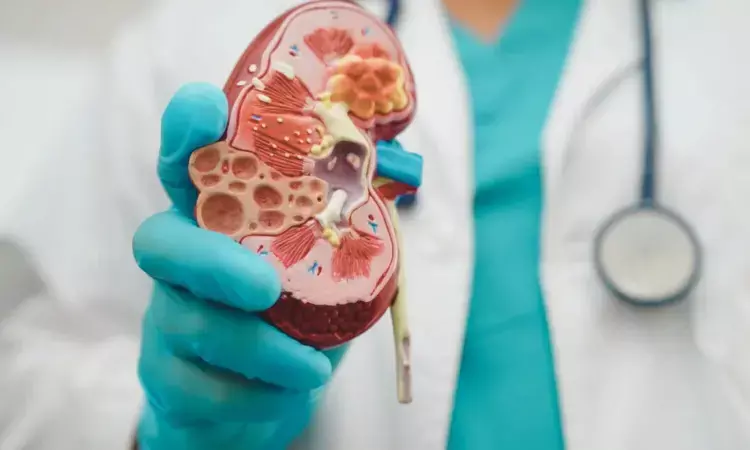- Home
- Medical news & Guidelines
- Anesthesiology
- Cardiology and CTVS
- Critical Care
- Dentistry
- Dermatology
- Diabetes and Endocrinology
- ENT
- Gastroenterology
- Medicine
- Nephrology
- Neurology
- Obstretics-Gynaecology
- Oncology
- Ophthalmology
- Orthopaedics
- Pediatrics-Neonatology
- Psychiatry
- Pulmonology
- Radiology
- Surgery
- Urology
- Laboratory Medicine
- Diet
- Nursing
- Paramedical
- Physiotherapy
- Health news
- Fact Check
- Bone Health Fact Check
- Brain Health Fact Check
- Cancer Related Fact Check
- Child Care Fact Check
- Dental and oral health fact check
- Diabetes and metabolic health fact check
- Diet and Nutrition Fact Check
- Eye and ENT Care Fact Check
- Fitness fact check
- Gut health fact check
- Heart health fact check
- Kidney health fact check
- Medical education fact check
- Men's health fact check
- Respiratory fact check
- Skin and hair care fact check
- Vaccine and Immunization fact check
- Women's health fact check
- AYUSH
- State News
- Andaman and Nicobar Islands
- Andhra Pradesh
- Arunachal Pradesh
- Assam
- Bihar
- Chandigarh
- Chattisgarh
- Dadra and Nagar Haveli
- Daman and Diu
- Delhi
- Goa
- Gujarat
- Haryana
- Himachal Pradesh
- Jammu & Kashmir
- Jharkhand
- Karnataka
- Kerala
- Ladakh
- Lakshadweep
- Madhya Pradesh
- Maharashtra
- Manipur
- Meghalaya
- Mizoram
- Nagaland
- Odisha
- Puducherry
- Punjab
- Rajasthan
- Sikkim
- Tamil Nadu
- Telangana
- Tripura
- Uttar Pradesh
- Uttrakhand
- West Bengal
- Medical Education
- Industry
FK506 with rapamycin could effectively improve renal transplantation prognosis, suggests study

A new study published in the journal of BMC Nephrology suggests that FK506 and rapamycin may be able to enhance the outcome of kidney transplantation by lowering interstitial fibrosis, vascular inflammation, and ultimately transplanted kidney rejections.
Over time, chronic kidney disease (CKD) has grown to be a serious worldwide health issue. About 130 million individuals in China suffer from CKD, of which the prevalence is 10.8%. Of them, 1-2% eventually develop end-stage renal disease (ESRD). Replacement treatment, such as peritoneal dialysis, hemodialysis, and allograft kidney transplantation (KTx), is currently the mainstay of care for ESRD patients. Patients are nonetheless suffering from late allograft failure despite significant advancements over the previous few decades. Many variables that impact the prognosis of kidney transplant patients have been widely documented globally in recent years. These variables include recipient baseline data, surgical outcomes, immunosuppressive regimes, and more. Therefore, Yisheng Ji and colleagues undertook this study to assess the impact of rapamycin and the long-term renal transplant prognosis from a single-center in China throughout a 30-year follow-up.
A total of 654 individuals who received kidney transplants between 1989 and 2020 were included in this research. The fundamental attributes of the patients that were involved were gathered. K-M curves, or Kaplan-Meier curves, were employed to compare and characterize graft survival. A multivariate Cox proportional-hazards model had both continuous and categorical variables. The patients were split into two groups, namely the traditional tacrolimus-based triple immunosuppression regimen group (n = 218), and the rapamycin-based quadruple immunosuppression regimen group (n = 41). The frequency of rejection, acute rejection, and banff score were compared between the indication biopsy findings of the two groups.
After surgery, the median survival period is 14 years. Risk variables for diabetes, immunosuppressants, globulin, urine albumen, blood glucose, and BMI were found using multiple Cox regression analysis. The model also revealed that rapamycin and FK506 together might significantly improve the transplant prognosis.
The overall survival rate of renal grafts in the rapa group was considerably higher than that in the traditional group, as indicated by the K-M curve. Also, the biopsy records showed that the rapa group had a reduced risk of immunological rejection than the standard group did. According to the Banff score, the transplanted kidney of the rapa group showed decreased vascular inflammation. Overall, the predictive model and subgroup analysis revealed that FK506 paired with rapamycin might significantly enhance the prognosis of kidney transplantation, which could be attributed to decreased acute rejection and vascular inflammation.
Source:
Ji, Y., Sun, L., Fei, S., Gao, X., Chen, H., Han, Z., Tao, J., Ju, X., Wang, Z., Tan, R., & Gu, M. (2024). Long-term outcomes in rapamycin on renal allograft function: a 30-year follow-up from a single-center experience. BMC Nephrology, 25(1), 1–10. https://doi.org/10.1186/s12882-024-03730-8
Neuroscience Masters graduate
Jacinthlyn Sylvia, a Neuroscience Master's graduate from Chennai has worked extensively in deciphering the neurobiology of cognition and motor control in aging. She also has spread-out exposure to Neurosurgery from her Bachelor’s. She is currently involved in active Neuro-Oncology research. She is an upcoming neuroscientist with a fiery passion for writing. Her news cover at Medical Dialogues feature recent discoveries and updates from the healthcare and biomedical research fields. She can be reached at editorial@medicaldialogues.in
Dr Kamal Kant Kohli-MBBS, DTCD- a chest specialist with more than 30 years of practice and a flair for writing clinical articles, Dr Kamal Kant Kohli joined Medical Dialogues as a Chief Editor of Medical News. Besides writing articles, as an editor, he proofreads and verifies all the medical content published on Medical Dialogues including those coming from journals, studies,medical conferences,guidelines etc. Email: drkohli@medicaldialogues.in. Contact no. 011-43720751


